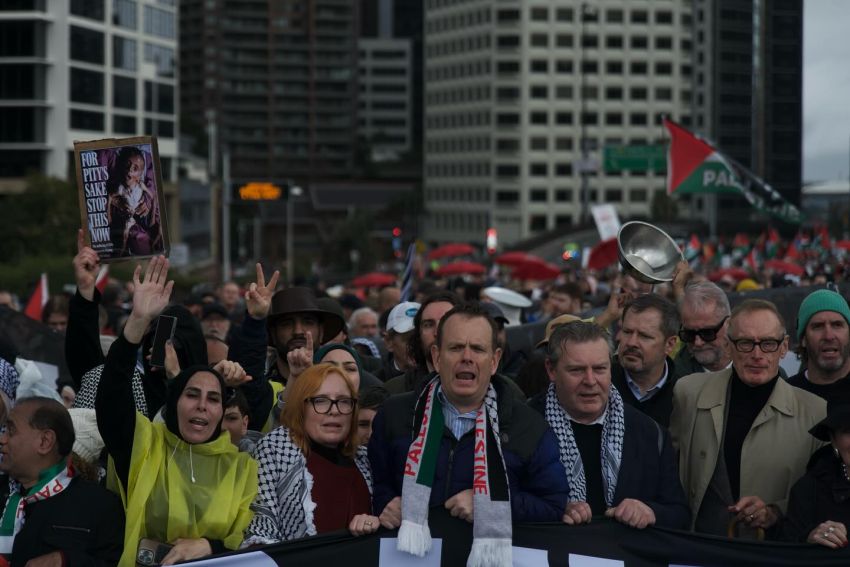
State Labor governments’ opposition to the August 3 pro-Palestine marches across Sydney’s Harbour Bridge and in Naarm/Melbourne shows capitalism cannot stomach popular democracy.
The whole point of the right of freedom of assembly is that people can do it when they are ready to and be seen doing it — otherwise it’s not needed. It’s voluntary, not institutionalised, and won’t happen in set numbers or to a schedule, but rather when people are moved to act.
But these governments and state bodies, like the police, which would facilitate this action if they were democratic, won’t have people expressing their views in the streets, nor on bridges in particular.
Capitalism might adopt some of the forms of democracy, such as electing representatives. But these representatives, as a whole, rule for the rich. They try to provide cover for a system that imposes rich people’s rules on us to their benefit.
Otherwise, capitalism would be finished. As things stand, capitalist “democracy” is killing democracy. Support is diving for what people are told is democracy.
On the other hand, what is attractive about the idea of democracy is that people can freely deliberate and, as a group, decide what will happen.
Capitalism resolutely opposes that popular democracy.
Two decades ago, when a million or more people, expressing popular opinion, marched in Australia against the war on Iraq, then Liberal-National Party Coalition Prime Minister John Howard derided the protesters as a “mob” and troops were sent to join that invasion.
The anti-war protesters knew the premises for the Iraq war were false, and had sought to avoid the prolonged slaughter that was to follow from the imperialist assault.
Labor only needs to be in government to take the same approach as Howard did.
Historian Frank Bongiorno recently told Deepcut News: “We shouldn’t be too shocked or surprised”. Labor in government, he said, uses “the coercive powers of the state to suppress protest and dissent”.
Examples include the conservative Ben Chifley government deploying the military to break a coal strike in 1949, the Bob Hawke, John Cain and Neville Wran governments’ crackdown on builders, labourers and airline pilots in the 1980s, and, more recently, Labor state governments’ adoption of harsh anti-protest laws against climate activists and now those protesting for justice in Palestine.
Bongiorno said Labor does not think of itself as “a protest movement [but as] a party that seeks to capture and to exercise power”. Therefore, that power can only be within an unchanged social system.
Does Labor dissent matter?
The excuses by NSW Labor MPs and NSW Police against the Harbour Bridge march were pitiful.
Premier Chris Minns originally said he would never allow a protest in “any circumstances”. After the historic Harbour Bridge march, he was maintaining the pretence that some sort of “balance [between] public safety [and] the public’s right to protest” needed to be struck.
There were no arrests, and senior police admitted the protesters had been patient and orderly.
That’s no surprise, because, as has happened throughout history, the marchers were engaged in purposeful action. They wanted everyone there. They knew that what mattered at that moment was their numbers and they were not going to do anything to weaken that possibility.
Taken as a whole, the march was self-organising. Any prospect of chaos came from the police thinking they knew better. The state instructed the train and ferry stations, the means for the march to disperse, to close. They ordered the march to turn around. That is when people might have panicked, but that did not happen. Hundreds of thousands of people walked through the CBD to find their ways home, all in wonder at the enormous turnout.
The mainstream media suggests the next day Minns’ parliamentary caucus took him to task. The criticism appears to have been limited to a complaint he hadn’t “read the room” on the genocide in Gaza and that this was not the time to further restrict the right to protest.
A few NSW and federal Labor MPs joined the Harbour Bridge march, one of whom has attended most of the Palestine Action Group’s rallies since October 2023. NSW Legislative Council MP Anthony D’Adams and member of Labor Friends of Palestine told NSW parliament on August 7 that he had been “gagged” and had faced “bullying behaviour” in a caucus meeting after he tried to criticise Minns.
“I was howled down, abused, told I should resign from the Labor Party, and a motion was moved to gag me from speaking … the caucus appears incapable of entertaining dissenting views and took the step that it did,” D’Adam said.
The fact that a handful of Labor MPs are willing to defend democratic rights is welcome, but for consistent working-class struggle they will need to be part of an organisation that enables, not constrains, that.
Labor is not that organisation; it is a democratic failure.
In Bongiorno’s words: “The system itself is insufficiently democratic. It’s insufficiently responsive to the needs and aspirations of people who have less power. Undoubtedly, people are concluding that there’s something fundamentally wrong with the way our democratic order operates.”